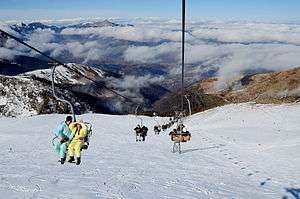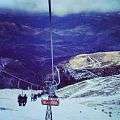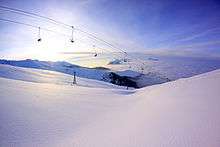Brezovica ski resort
Brezovica ski resort or Brezovica ski center (Serbian: Ски центар Брезовица, romanized: Ski centar Brezovica), is a mountain resort and the largest center of winter tourism in Kosovo.[lower-alpha 1] Located on the slopes of Šar Mountains, it is mainly a destination for skiing and snowboarding. In the summer, eco-tourism opportunities include hiking, mountain biking, golf, and other outdoor recreational activities. Hiking paths can lead the visitors to the nearby Livadičko Lake.
| Brezovica ski resort | |
|---|---|
 Brezovica ski resort | |
 Brezovica ski resort Location within Kosovo | |
| Location | Šar Mountains |
| Nearest major city | Brezovica, Štrpce, Kosovo[lower-alpha 1] |
| Coordinates | 42°13′19″N 21°00′17″E |
| Top elevation | 2,212 m (7,257 ft) |
| Skiable area | 15.6 km (9.7 mi) |
| Runs | 9 |
| Longest run | 3.5 km (2.2 mi) |
| Lift system | 9 total |
| Lift capacity | 10,000/hour |
| Snowfall | 128 days |
| Website | www |
History
Brezovica ski resort was established in 1954. The ski resort area is ideally situated on the north and northwest-facing slopes of the Šar National Park. The first of five ski lifts to the resort was installed in 1979. The resort features 16 kilometers of ski slopes located on the north and northeast facing slopes of the Šar Mountains. The resort was host to a number of international skiing events in the 1980s and 1990s but has since been developed for tourism.
Although Brezovica served as an alternative site for downhill skiing events of the 1984 Sarajevo Winter Olympic Games and hosted a number of International Ski Federation events in the 1980s and 1990s, the resort has not received significant infrastructure investments for more than two decades.[1]
The legal status of Brezovica ski resort was disputed since the 1999 Kosovo War, as both the Government of Serbia and Government of Kosovo claim that they have property rights over it.[2] This resulted in lack of investments for more than two decades.[2]
In November 2014, the Government of Kosovo signed a 410 million euros contract with French consortium led by Compagnie des Alpes, to develop Brezovica ski resort over next two decades.[3] However, in June 2016, the contract was cancelled as the French consortium couldn't provide bank guaranties for the investments.[4]
As of 2018, the most of the tourists are coming from Kosovo and neighboring Albania.[5]
Gallery
 Top of Brezovica ski resort
Top of Brezovica ski resort- Ski lift in Brezovica ski resort
- Ski lift in Brezovica ski resort
 Ski lift
Ski lift Skiing on trail
Skiing on trail Snowboarding on trail
Snowboarding on trail
Features

The ridge line spans 39,000 hectares of high alpine mountain terrain and forests, with a highly diverse and abundant flora and fauna. Located within 90 minutes of two international airports (Pristina International Airport and Skopje International Airport), the Brezovica resort area represents one of the last remaining under-developed ski resort areas in Southeast Europe. Inside of this area are ski slopes with average length of about 4 km (2 mi) and an average of 38% flexibility, at the sea level of 1,718 meters. The station of the outline with the exit from the cable car, is at a height of 2,212 meters above sea level. Ski center Brezovica is open for skiing during the seasons, where in summer its surface is covered with snow, with a low exploitation possibility. Wide ski terrains of the Ski Centre Brezovica are made of a system that includes: five chair lifts and 5 ski lifts, connected with 16 km (10 mi) of ski slopes of the average length 3,000 meters. Three new lifts opened in 2008. On Brezovica FIS slopes for slalom, giant slalom, downhill race and "Super G" simultaneously could ski 50,000 skiers.
A number of successful national and international competitions are held at the resort, including the Belgrade-owned "Inex ski center Brezovica", among others.[1] A number of Kosovo winter sport teams train at the resort. A major investment from MDP Consulting Compagnie des Alpes is expected to have a significant impact in the area concerning environmental issues.[1]
Wide ski terrains of the Brezovica ski resort are made of a system that includes: 5 chair lifts and 5 ski lifts, connected with 16 km of ski slopes of the average length 3,000 meters. On Brezovica FIS slopes for slalom, giant slalom, downhill race and “Super G” simultaneously could ski 50,000 skiers.
The ski slopes have an average length of 4 kilometers and an average of 128 skiable days per year.
The ski centre has around 700 beds in four hotels, while additional accommodation possibilities exist in independent hotels and private facilities. However, these hotels are either operating minimally or are closed due to legal disputes between Government of Serbia and Government of Kosovo.[2] Hotel clients have free transportation and free access to ski lifts. The construction of private houses is booming in the area despite it being a natural park.[6]
See also
References
- Neville, Tim (24 February 2016). "Skiing Kosovo, Abandoned Lifts and All". nytimes.com. Retrieved 23 December 2018.
- "Čiji je ski centar Brezovica?". b92.net (in Serbian). Danas. 8 May 2013. Retrieved 23 December 2018.
- "Kosovo appoints French consortium to develop ski resort". reuters.com. 17 November 2014. Retrieved 23 December 2018.
- "Koha: Propao projekat "Brezovica"". blic.rs (in Serbian). Tanjug. 17 June 2016. Retrieved 23 December 2018.
- Džodan, N. (6 March 2018). "PUTEVIMA CRVENIH BOŽURA, SKIJANJE I VIA FERATA Kako izgleda turistička ponuda Kosova i ko tamo najčešće putuje". blic.rs (in Serbian). Retrieved 23 December 2018.
- "Brezovica Ski Resort". viewkosova.com. Archived from the original on 2014-03-06. Retrieved 2014-03-02.
- Kosovo is the subject of a territorial dispute between the Republic of Kosovo and the Republic of Serbia. The Republic of Kosovo unilaterally declared independence on 17 February 2008, but Serbia continues to claim it as part of its own sovereign territory. The two governments began to normalise relations in 2013, as part of the 2013 Brussels Agreement. Kosovo is currently recognized as an independent state by 97 out of the 193 United Nations member states. In total, 112 UN member states recognized Kosovo at some point, of which 15 later withdrew their recognition.
External links
| Wikimedia Commons has media related to Brezovica ski resort. |
- Official website
- Ski resort Brezovica at skiresort.info
